by Jenny Rose | Jun 22, 2024 | Emotional Intelligence, Needs
In a recent conversation, someone asserted to me that ultimately everyone does what they want. I felt an immediate fury. That does not describe my life at all. I chewed on my outrage and resentment for a few weeks, simmering, until I decided to get over it and figure out why I was so hijacked.
I was immediately lost in the puckerbrush. Making choices about what we do and don’t do is intimately tied to needs and wants, and I have yet to be able to distinguish between the two once beyond the level of survival needs, or find any kind of clarity from someone else. Needs and wants are unpleasant territory I don’t want to explore. (See? There it is. I don’t want to. Yet I am, and I might need to.)
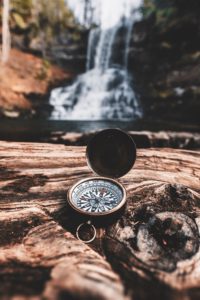
Photo by Bryan Minear on Unsplash
Then there’s the whole actions versus words aspect. People say they want things but don’t act accordingly. If we really want something, our behavior reflects it. If our behavior does not reflect our stated wants, we’re deceiving ourselves, or someone else, or both. I deeply distrust mixed messages. More unpleasant territory and old trauma.
Choice is in there, too. Choice is a big subject and a major theme in this blog. As I’ve mused on the statement ‘we all do what we want to do’ and made notes (you know I always make notes), I’ve wondered how we can compare a parent in some war-torn place attempting to keep their starving child alive another day with a wealthy person trying to decide if they want to fly their private plane to Paris for dinner or stay in and watch a movie in their in-home theater and have their chef prepare a seven-course meal. With wine, naturally.
One person has limited choices, all excruciating, to achieve continued survival for a few hours. The other has almost unlimited choices, all luxuries. How can I possibly compare the two? Can we say the parent trying to keep their child alive is doing what they want to do? Come on! Yet they do want to keep their child alive, right?
Perhaps it seems complicated and confusing because it’s complicated and confusing.
I wound up with a page full of notes, some sobering personal revelations, and a hairball.
On an internet search, I found articles pointing out the distinction between doing exactly what we want to do in any given moment (a toddler or a hedonist) and doing things we don’t want to do in service to an outcome we do want. That made sense to me.
If we focus on wanted outcomes rather than individual actions, we must have the ability to plan, look ahead, anticipate, and understand possible consequences of our actions. We also must attempt to predict the responses and reactions of the people around us to our actions, which means we have to understand something about emotional intelligence …
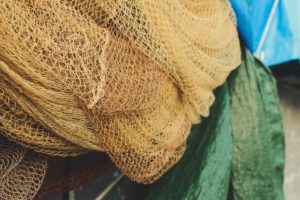
Photo by Manuel Sardo on Unsplash
… and now we’re back in the puckerbrush. I hate predictions. I don’t like leaps of faith. (I have a magnet on my fridge that says “Leap and the net will appear.” I don’t know why I keep it. It makes me mad every time I read it. Show me the warranty on that net. Show me the weight testing. Show me the damn net, in fact. Who will set it up when I leap? Are they paying attention or looking at their phone?) I trust my intuition, but I know I can be wrong. People are unpredictable. Life is unpredictable.
And yet we humans, including me, make choices all day long every day based on what we think will or might or could happen next. I’ve written about attachment to outcomes before. As I get older I’ve replaced a lot of my desired specific outcomes with simply wanting to know I did my best, regardless of outcomes. I may not like the outcome I get, but my integrity remains intact.
And then there are the people who don’t seem to understand actions and consequences in any kind of relationship. They choose what they choose in the moment and are hurt and/or outraged to discover the downstream consequences of that choice, especially in the context of many other choices. I observe this is a frequent divide along male/female lines. Women generally see everything as connected. Men generally see most things as discrete, in their own box. This is just one reason why I think “romantic” male/female relationships can be so devastating. We are often on different pages without knowing it.
If it’s true that we all do what we want in service to a desired outcome, what happens when my choices collide with yours? If you perceive me as blocking progress to your desired outcome you’re going to feel angry, and vice versa. We’re going to want each other to make different choices aligning with our personal desires. Most of the time, people won’t do that. We’re all attached to the outcomes we want.
A big piece of this for me is emotional labor, that hidden torrent winding through my life, sweeping away incalculable energy, time, and innocence. One of my priorities is healthy relationships. Close healthy relationships require time and attention; the ability to make choices for the good of the relationship rather than considering only our own wants and needs. This is an ongoing practice, not doing something we really don’t want to do once every six months and expecting applause. It means we have to face our own demons, learn to communicate clearly and honestly, negotiate, share power, and problem solve. It means boundaries and respect. It means reciprocity.
Having learned about reciprocity, I now prioritize my relationships to the degree the other does. I will not sign up to do all the emotional labor. I’m not interested in a close relationship like that. The price is too high. I’d rather put my energy into my relationship with myself. At least I appreciate my own efforts!
My conclusion about this ‘we all do what we want’ thing (gritted teeth – it still makes me mad), is it may be true if we consider our choices in the context of outcomes. I’ve made a lot of choices out of the clear knowledge that they were simply the right thing to do, too, choices that have been terrible for me, terrible in some of their consequences, yet ultimately still were the right thing for me to do. I had no outcome in mind. I don’t regret those kinds of choices, but they left permanent scars.

Photo by Cristian Newman on Unsplash
I want to blame others for all the time I’ve spent doing things I didn’t want to do, but it seems what we do and don’t do are entirely in our own hands, our own responsibility. Our lives are built on the choices we make, big and small, every hour of every day. If we don’t like our lives, we need to pay attention. Perhaps the useful question to ask ourselves if we hate what we’re doing at any given moment is, “Why am I doing this?” If we’re focused on a particular desired outcome, we may need to stop and think about whether our actions are effective in getting us there. Spending years of our lives desperately hoping and trying to reach an outcome and doing things we hate is not effective. I know this from personal experience. Our wants and needs change over time; what we once longed for may no longer be something we’re interested in. Sometimes we need to reality check ourselves. If we’ve been trying to get loved, for example, or please someone for a long period of time, it might be time to acknowledge our goal is not attainable or not worth attaining. Sometimes no matter how hard we work for an outcome it’s not achievable.
Then there’s the flip side: None of us do what we don’t want to do. That one is equally hard for me to swallow, but that’s a conversation for another day.
Questions:
- How much of each day do you spend doing things you don’t want to do? Why?
- What desired outcome(s) in your life requires you to do things you don’t want to do?
- Do you see your daily choices as isolated or part of a larger context attached to your wants and needs?
- Do you feel forced to labor emotionally? What would happen if you stopped?
- Who in your life reciprocates your level of emotional labor?
Leave a comment below!
To read my fiction, serially published free every week, go here: 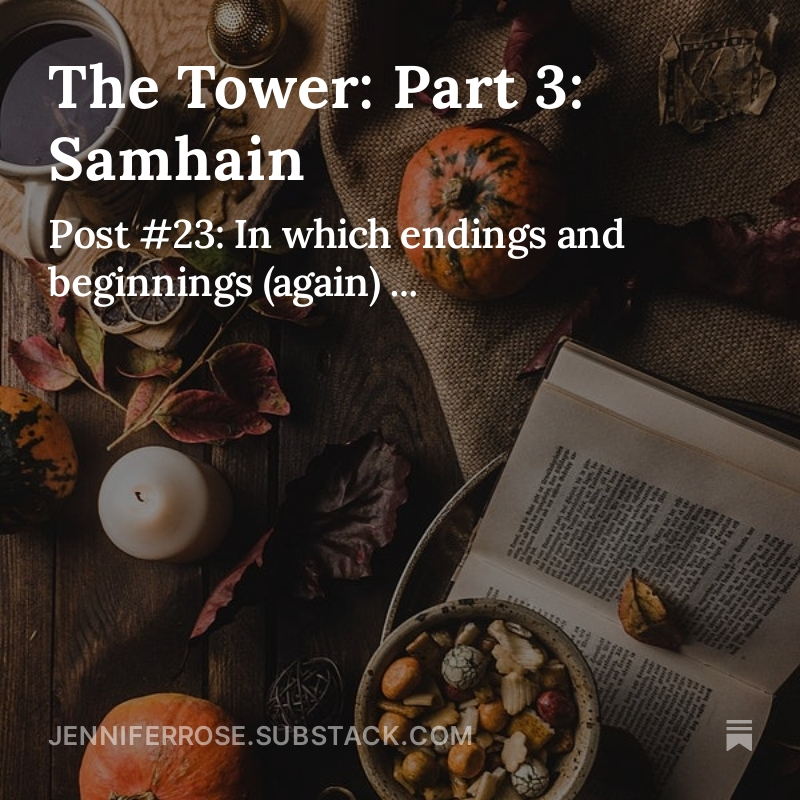
by Jenny Rose | Jan 20, 2024 | Emotional Intelligence, Feelings
(Due to a technical glitch, most of you were not notified when I last posted. You can follow this link to read the post if you missed it. I think the problem is fixed now!)
As so often happens, several threads came together to weave this post. The first was a suggestion from Seth Godin to follow our wandering mind, as that’s where our heart might be.
On first read, I smiled and thought “of course,” because following my imagination is one of my greatest pleasures.
As I considered it over a period of days, however, noting where my mind wanders, I discovered something.

Photo by John Salvino on Unsplash
I happily follow my wandering mind as long as I feel undisturbed about where it goes. The minute I start to get uncomfortable, however, I shackle it. Brutally. This might be with distraction, compulsive productivity, or starting to speed. A lot of people eat, overexercise, or get trapped in substance abuse. Let us count the ways!
I have rules about where my mind is allowed to go. I enforce my rules without mercy, in collaboration with draconian internal voices. My rigidity is not so much about my thoughts wandering as it is the feelings I have about my thoughts. This is emotional intelligence 101, and I’ve written about it before.
Thoughts and feelings are not the same thing.
In essence, then, I’m putting a lid on my feelings. Again. Still.
Sigh.
It doesn’t work. It never works, and I know this, but I do it anyway.
I do it for the same reason we all attempt to avoid painful feelings. They’re painful! Avoidance is easier than allowing ourselves to feel them, find healthy ways to express them, and let them go.
How many thoughts do we have in a day? I suspect most of us chew on the same preoccupations day after day, whether our thoughts engender feelings of rage, grief, fear, or shame, or a combination du jour. Uncomfortable territory. Also highly addictive territory. I’m chagrined to admit my own attraction to struggle. It’s so easy! Which is ridiculous, because it makes everything much, much harder than it needs to be, physically, emotionally, and generally.
Maybe what I mean is it’s so familiar!
As humans, we have an irresistible compulsion to notice, emphasize, and dwell upon the negative rather than the positive. That’s why so many people find relief in a gratitude practice, including me. Switching from a negative to positive focus requires mindfulness and mental effort, but the relief from anxiety and stress is immediate.
I should do it more often. Like ten times a day.
Understand, I’m not suggesting we avoid our feelings. I’m suggesting we take control of our thoughts, especially the negative kind. Feelings rise and fall inescapably. They’re biochemical messages from our physical bodies. We were made to have feelings. What we do with them, of course, is well within our control. Thoughts, however, are ours to steer.
Feelings, though arising naturally, are contagious and easily manipulated. That’s why advertising and social pressure work so well. Our feelings can be deliberately manufactured to serve those who would control our money, our votes, and our humanity.
On the other hand, this means we can to some degree manipulate our own feelings with our thoughts.
I came across an article by writer and speaker Rob Henderson, who I follow on Substack. He wrote a piece listing lessons he’s learned during a challenging life, beginning in the foster care system. One of the lessons is “you are what you do.” Not what you feel, but what you do.
I thought immediately of my writing community on Substack, where each of us struggles with what it means to be a writer. I don’t speak for anyone else, but I’ve called myself a writer ever since I began writing. Writers write. That’s what I do.
I like to keep things simple (even though I often don’t, which is a perfect example of what I say versus what I do!)

Photo by Alex Iby on Unsplash
We are what we do. I agree. We are not entirely defined by what we think and feel. I’ve known that ever since I went through emotional intelligence training. We’re also not defined by who we say we are, or who others say we are. We are not our highly polished and desperately maintained identity. Our true thoughts and feelings, the private stuff no one else can see or hear, steer our choices and actions, and those are what truly reveal our most authentic selves.
It follows if we want to change, we must do things differently. As many others have discovered long before me, true change comes from the inside out. If we manage our thoughts and feelings in healthy ways, our actions change. That’s why short-term strategies like diets often fail. A temporary diet does not address our broken relationship with food, a much harder proposition to tackle.
We seem to be on a giant rack, ever widening, between who we think we should be or must be and who we really are. The struggle and tension threaten to tear us apart, yet we cling to our rack, desperately holding ourselves together, too afraid to relax into who we really are and make peace with our true selves.
In a constant state of tension, we don’t let our minds wander. We can’t afford to. We don’t have access to the peace and quiet or even boredom a wandering mind requires. Our technology has erased the fertile ground of boredom, particularly for our children. We feed our hearts a diet of distraction, manufactured drama, busyness and productivity; a hunger for more, bigger, better, newer things, and expect it to be satisfied. We ignore or numb our feelings, or turn them into destruction of ourselves and others.
I often think of this Chinese proverb:
Tension is who you think you should be. Relaxation is who you are.
Toxic positivity is not an effective coping mechanism. Nor is a state of deep depression and withdrawal, as in addiction. I want to find a path between the two.
Perhaps my wandering mind knows the path and will point the way if I allow it to. Perhaps our minds know exactly where our hearts are but we’re too afraid to know.
Questions:
- When your mind wanders, where does it go?
- How do you feel about where your mind wanders?
- How do you think an inability to focus (distractibility) might in some cases be connected to a refusal to follow the guidance of mind and heart?
Leave a comment below!
To read my fiction, serially published free every week, go here: 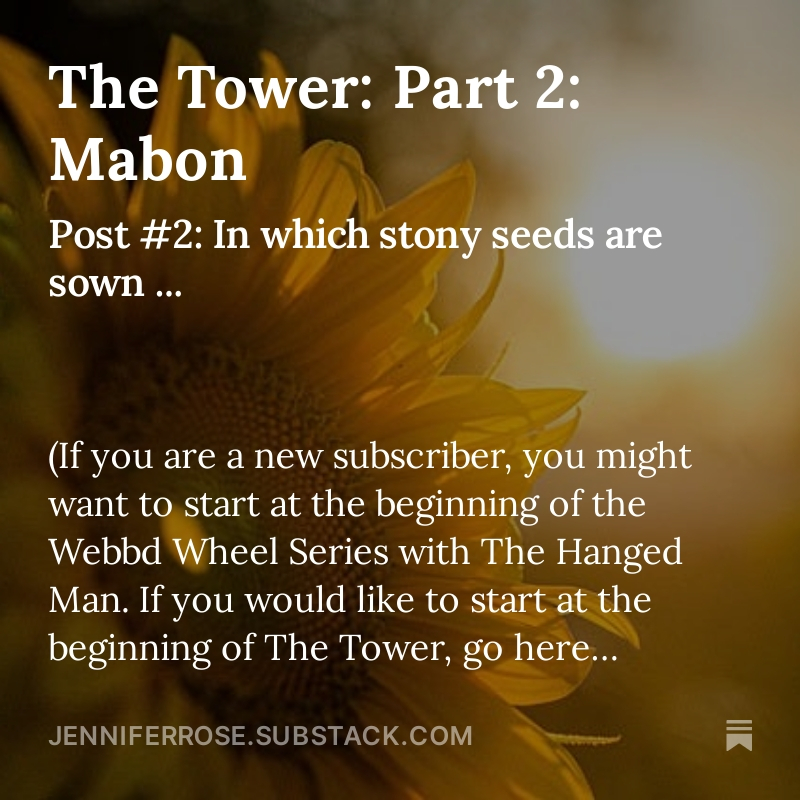
by Jenny Rose | Aug 10, 2017 | A Flourishing Woman, The Journey

Photo by Andrew Montgomery on Unsplash
I often imagine life as a river and myself in a boat of my own making, floating on it. I don’t picture a sailboat, having no experience of one, but a small boat that glides with the current and can be paddled. I don’t imagine a single river, but a vast network, far more than I could ever explore in this lifetime. Sometimes it’s a river of water, sometimes a river of stars. Sometimes it’s a river of green moss carving a path through thick forest. Sometimes it’s an air-borne river of leaves and feathers and pieces of sky.
Sometimes it’s a river of stone.
The thing about rivers is they take me where they take me. I can paddle and steer, but whatever river I’m on at any given moment is a living thing in itself. I’m not its master and it doesn’t ask me where I want to go.
Of course, I don’t have to surrender to this kind of movement. I can refuse to make a boat in the first place, refuse to learn how, refuse to try. I can take a short cut and buy a premade boat or jump in someone else’s boat. If I do manage to create a boat, I can still make my way to the shore at any point and stop.
I can always throw myself out of the boat, too … but then I’ll never find out where the river is taking me.
I can also fight with the current.
I know a lot about this.
In the last few days, I’ve been floating on a river of stone.

Photo by Paul Van Cotthem on Unsplash
Stone is very, very, v…e…r…y slow. Oh, it moves, in the deep foundations of life. It shifts and compresses, slips, breaks down, heats and cools. It tells an old, old story, whole volumes of which are faded and weathered into illegibility, or hidden so well I know I’ll never read them. Now and then, though, a period of grace arrives in which I inadvertently enter a river of stone and have an opportunity, which I reject, avoid and try to escape, to hear whispers of stone stories.
During these times, others on the river are out of sight and out of hearing. My calls echo back to

Photo by Milada Vigerova on Unsplash
me off stone canyons and cliffs. I reach out for another in my sleep and wake with bloody knuckles. On the river of stone others do not respond. They don’t follow through. They don’t keep their word. My password doesn’t work. I can’t log on. There is no clarification or confirmation. I’m alone, in my little boat, and I feel adrift and forgotten, unseen and unheard, left behind.
The river of stone tells me a story of foundations, of beginnings, of layers of time and events, of family and tribe. My agenda, my insistence on movement and progress, my puny frustration with things not done, make less impression than a fragile-winged dragonfly that flung itself into the stone’s embrace uncounted aeons ago and flies now forever in the river of stone.
The river of stone is inexorable. It forces me to slow down. It provides me with no distraction and no easy entertainment. Creativity falls into sleep from which I cannot wake it. Those tasks and activities I call “productive” cease. Frantically, I paddle my boat, one side, then the other, until my hands are bloody blistered and my shoulders are a block of pain. All the old demons in my head leap into life, jeering and heckling, joining hands in gleeful celebration, and they have their way with me because I’m trapped in a river of stone.
I accomplish nothing on a list. I write no pages. Plans fall through. I wait too long to walk, and then it rains. Dirty dishes sit on the counter. All I want to do is get lost in an old familiar book — if only I could stay awake long enough!
Then, gradually, frustration, panic and fear exhaust themselves and lie down to rest. I rediscover the beauty of emptiness. I begin to see veins and gems and stardust in the stone around me. I remember the difference between doing and being, and the delicate balance they must maintain. The stone speaks to me of strength, of endurance, of centering and grounding. I give myself to the pause in communication and creative work. I put down the paddle, the oar, stretch out in the boat and rest, dreaming of stone-lipped wells refilling with spring water, dreaming of a spray of words leaping off waves or trailing behind stars in a river ahead, dreaming of friends whose faces I haven’t yet seen and broken connection repaired.
I doze, rocked in a cradle of stone. I rest, floating on a river of rock. I sink into the slow, deep, stony heartbeat in the center of all things, imagine inhalations and exhalations, each lasting 100,000 years.
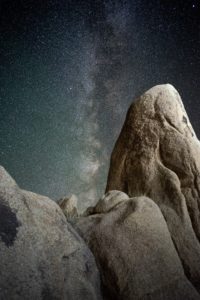
Photo by Brent Cox on Unsplash
I surrender to the river of stone, and in doing so I float out of it.
All content on this site ©2017
Jennifer Rose
except where otherwise noted
by Jenny Rose | Apr 6, 2017 | A Flourishing Woman, Creativity
Walking on our 26 acres, my path winds around open fields and keeps me out of heavy woods and brush, where ticks are waking. It’s grey and overcast, not raw but damp, a combination of snow and rain coming down and turning my already wild hair into a mad woman’s wig. The surface of the snow is glazed hard in most places, but when I get close to the tree line or streams that trickle down to the river, I punch through it and sink. Walking on the thick layer of leaves under and among the trees is like walking on a sopping sponge. My socks are sodden inside my winter boots.
I see thickets where the deer have slept, melting the snow with their warm bodies, lying out of the wind in the shelter of trunk and branch. I imagine them rising to their feet, squatting in their awkward way to leave pellets and a splash of urine, and then stepping away through the snow with those delicate hooves and legs. Their spoor is everywhere.

Photo by Teddy Kelley on Unsplash
The medical transcription business is wildly unpredictable. One seesaws between frantic pleas from supervisors for overtime because of a sudden flood of work and the dreaded “no jobs available” message upon logging in. As I’m paid by production, no work means no money. Since the new year, work has been slow in the company and transcriptionists and supervisors alike are feeling the stress.
I’ve been thinking about my fear of not enough these days, and how small it makes me and my experience of life. One of the reasons I like to go out and walk is because it pushes against my tendency to curl up in corners and play hours of solitaire while I make up stories about living under bridges and berate myself for NOT PULLING MY WEIGHT and WASTING TIME.
The river is still ice covered, the edges yellowish and slushy. I see animal prints in the snow over the ice, but I wouldn’t dare try to walk on it. As I lean against a tree and look down at the ice-bound river, I hear a nesting pair of barred owls calling to each other, though it’s still early afternoon.

Photo by Vincent Foret on Unsplash
The truth is my medical transcription job is nothing more than a means to an end. It’s all about the paycheck. I take some modest pride in my ability to do an accurate, fast job, but I’m just a pair of skilled hands and ears. One day, when the job and I are finished with one another, I’ll leave no remnants of myself, no track, no scent, no spoor. It irritates me that it has so much power in my life when it means so little.
Water drops tremble on bare twigs and tree branches. The pussy willows are beginning to bud. Cloudy light washes the willow buds and water drops the same silvery grey and I have to draw near to tell the difference.
We’ve lately found a local lawyer to help us update our wills and take care of end-of-life paperwork. It’s made me think about all the fragments I’ll leave behind me, the furniture I’ve loved and polished; the mirror I’ve looked in since I was a child; the books I’ve handled and read in cars, in bathtubs, at tables, in beds and chairs and waiting rooms. All these things will be sifted through, separated, sold, passed on. What money there is will be divided and wind up in other bank accounts or hidey holes or cast back into the flow somehow. Perhaps whispers of me will cling to a few objects, but for the most part no one will ever know I passed this way.

OLYMPUS DIGITAL CAMERA
We have an old shed on the land and snow slide off the roof has blocked the door and partially pushed it open. I’m just able to squeeze in over a thick layer of ice on the threshold, formed by melting snow dripping off the roof.
We cleaned out and swept the shed last fall, but I find pages of paper blown all over the floor, pages of the first draft of my book manuscript. Last summer we had visitors who used the shed, and I’d hoped they would read and give me some feedback. They didn’t, and I’d never found the manuscript when I looked for it after they left, but the winter currents and drafts discovered its hiding place. Perhaps the wind read it as it ruffled through the pages with chill fingers.
It’s odd to see those scattered pages on the cold, splintered floor. The sight of them gives me a desolate clarity. Those written words are the most important thing I have. Working or not working, large paycheck or vanishingly small paycheck, all the objects I love and use and call mine — none of that is really who I am. None of it really matters, though it takes up space in my life. None of it contains the smell of my breath, the taste of my pain or the spoor of my love the way my words do. It’s as though it’s me lying there, discarded, damp and wind strewn, unseen, unread, unwanted. It hurts me.
As I gather up pages, I note where the snow has drifted through gaps in corners. Wrinkled beech leaves lie on a discarded futon, whirled in through the broken window above it. I open a ramshackle cupboard and find a roll of shredded toilet paper and evidence of mice at work, making the most of an unexpected bonanza of nesting material.
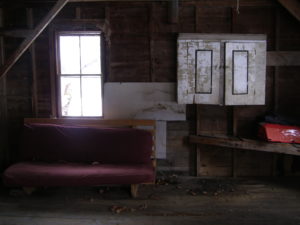
I find a bottle cap and cigarette butts on a window sill. More leavings. I know who stood there, smoking, looking out the window. I stood where he’d stood and picked up the butts, knowing his lips were around them, his long-fingered hand had carried them from pack to mouth and then stubbed them out in the bottle cap, a tiny ashtray. I wish for the nose of a wild creature so I could search for the cold, lonely ghost of his scent.
He was here. I am here. Deer crisscross this land we call ours. Mice go about the business of ensuring more mice, and the barred owls carry on their early spring conversation about mating, nesting, eggs and all those mice. We are so caught up in jobs and money and things. We give them so much meaning. The days go by and we alternately struggle and dance through them. But one day we’ll be gone, and we’ll all leave spoor behind, a scent or sign or footprint uniquely and simply ours.
These words are my footprints, my scent, my lingering warmth in the places I came to rest, my spoor. They are signs of my passage and the truest things I have to leave behind when I’m gone.
All content on this site ©2017
Jennifer Rose
except where otherwise noted














